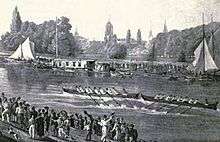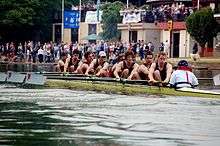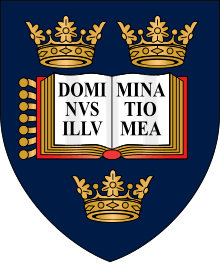Eights Week
| Summer Eights | |
| Head of the River | |
| Keble Men [1] | Pembroke Women [1] |
 |
 |
| Highest 2nd Eight (Men) | Oriel (Division III) [1] |
| Highest 2nd Eight (Women) | Wolfson (Division II) [1] |
| Course | Isis (upstream) |
| Course length | c. 1800m |
| Current supporter | Neptune Investment Management |
| Note: Last Eights 18 – 26 May 2018 | |
| OURCs - Summer Eights | |

Eights Week, also known as Summer Eights, is a four-day regatta of bumps races which constitutes the University of Oxford's main intercollegiate rowing event of the year. The regatta takes place in May of each year, from the Wednesday to the Saturday of the fifth week of Trinity Term. Men's and women's coxed eights compete in separate divisions for their colleges, with some colleges entering as many as five crews for each sex.
Summer VIIIs has seven men's divisions alongside six for women's, encompassing a total of 171 boats and around 1,500 participants. Including the qualifying rounds, in which success is termed "Rowing On", the number of participants in 2003 was over 1,800.
Overview


The racing takes place on the Isis, a length of the River Thames, which is generally too narrow for side by side racing. For each division, thirteen boats line up at the downstream end of the stretch, each cox holding onto a rope attached to the bank, leaving around 1.5 boat lengths between each boat. The start of racing is signalled by the firing of a cannon, each crew attempting to progress up their division by bumping the boat in front, while avoiding being bumped by the boat behind. Once a bump has taken place, both of the crews involved stop racing and move to the side to allow the rest of the division to pass. It is possible to "over bump" if the 2 crews in front of your boat bump (and so drop out) and your boat can catch the boat that was in front of them. They then swap places for the next day's racing, whether that be the calendar day or the first day of racing in the next year's competition.
The ultimate aim of a crew is to become "Head of the River" (top of the first division) and stay there. This entitles the winning crew to commission trophy oars in their college colours with the names and weights of the successful crew on them — commonly called "winning blades". As this is only possible for crews already near the top of division one, another way to win blades is to bump on each day of the competition. As the responsibility for awarding blades to crews rests with the individual colleges concerned, there are slight differences in the criteria required.
Double Headship
The "Double Headship" is an accolade awarded to any college finishing with both their men's and women's crews at the "Head of the River" in their respective divisions. Pembroke College is the only college to have achieved a Double Headship in Eights, having both men's and women's crews at the Head of the River in 2003.
A silver "Double Headship Trophy" was commissioned from the silversmith Peter Musson [2] in 2003, to commemorate the historic occasion. Pembroke College retains this trophy.
Early History of Eights
Although regular races between professional watermen had been known since 1715 when Doggett's Coat and Badge was instituted, amateur racing was unknown before 1808.[3] The first such race may have been held in Yarmouth in that year. These races were, however, "scratch" races between ad hoc crews entering on the day.
Meanwhile, recreational rowing had begun in Oxford very much earlier, with students rowing in single wherries at least as early as 1769.[4]
The first amateur races between organised clubs which prepared and trained for the event began in Oxford in 1815. In this year, crews from Brasenose College and Jesus College raced for the Head of the River, from Iffley Lock to Mr King's Barge, which was moored near the current Head of the River hotel. The event is also notable for the fact that both crews rowed in eight oared boats, specially built for the purpose. Such recreational as occurred at this time was usually conducted in pairs, or four or six oared cutters. The fact the racing was conducted in eight oared boats gave rise to the event being known as Eights.[5]
Brasenose College and Jesus College recontested the event in 1816, with Brasenose again triumphing. Christ Church joined in the event from 1817, when they went Head, a position they retained until 1819.
Christ Church did not row in 1820, and it is unknown whether any racing occurred. The next recorded races, between Brasenose and Jesus, were in 1821 and 1822. A dispute about professional watermen being allowed in college crews precluded racing in 1823. Until this time, Jesus and Brasenose had each used paid coaches who rowed in the stroke seats of the crews.
From 1824, Christ Church and Exeter College began racing, with Exeter going Head in that year. A rule banning the use of "out college men" (i.e. men from other colleges) rowing in college crews saw the entry of Worcester College in 1825, University and Balliol Colleges in 1827, and Oriel and Trinity Colleges in 1828.
Head of the River – Summary table (excluding World War 2 races)
| Blade | College | Men | Women | Headships[6] | Longest time held - Men | Longest time held - Women | Last Headship – Men | Last Headship - Women |
|---|---|---|---|---|---|---|---|---|
| Christ Church | 33 | - | 33 | 1828–32 | - | 2017 | - | |
| Oriel | 32 | - | 32 | 1978–84 & 1996–2002 | - | 2016 | - | |
| Brasenose | 24 | - | 24 | 1888–91 & 1928–31 | - | 1931 | - | |
| Magdalen | 20 | - | 20 | 1892–95 & 2004–07 | - | 2007 | - | |
| New College | 16 | 2 | 18 | 1896–99 | 2004–05 | 1986 | 2005 | |
| University | 13 | - | 13 | 1896–99 | - | 1986 | - | |
| Trinity | 13 | - | 13 | 1869–71 | - | 1991 | - | |
| Balliol | 10 | 2 | 12 | 1859–60 & 1955–56 | 2010–11 | 2008 | 2011 | |
| Pembroke | 4 | 6 | 10 | 2013 | 2000–03 | 2013 | 2018 | |
| St Edmund Hall | 5 | 4 | 9 | 1959–61 | 2006–09 | 1965 | 2009 | |
| Keble | 8 | - | 8 | 1967-1970 | - | 2018 | - | |
| Somerville | - | 8 | 8 | - | 1990–93 | - | 1993 | |
| Wadham | 2 | 5 | 7 | - | 2014–16 | 1856 | 2016 | |
| Exeter | 7 | - | 7 | 1882-84 | - | 1884 | - | |
| Osler Housea | - | 5 | 5 | - | 1988–89 & 1994–95 | - | 1995 | |
| Osler-Greenb | - | 4 | 4 | - | 1996–99 | - | 1999 | |
| St Hugh’s | - | 4 | 4 | - | 1982–84 | - | 1984 | |
| Queen’s | 3 | - | 3 | - | - | 1957 | - | |
| Corpus Christi | 2 | - | 2 | - | - | 1885 | - | |
| Hertford | 1 | - | 1 | - | - | 1881 | - | |
| Lady Margaret Hall | - | 1 | 1 | - | - | - | 1977 | |
| Merton | 1 | - | 1 | - | - | 1951 | - | |
| St John’s | - | 1 | 1 | - | - | - | 2013 |
| a Since 2008 this crew composition does not exist anymore. Prior to the foundation of Green Templeton College members of Green College raced with Osler House whereas members of Templeton College raced with Hertford College. |
| b Prior to the composite crew with Green College and after the foundation of Green Templeton Boat Club Osler raced as an independent crew formed of clinical medical students. |
Head of the River – Men
Eights Week has been held since 1815.[7][8]
No racing occurred during World War I. In World War II, although college rowing continued, there were insufficient students for normal racing between colleges to be maintained. As a consequence, most colleges competed in composite clubs, and the number of crews competing was greatly curtailed. After the war, normal racing continued, and in 1946 college crews started in the order in which they finished in 1939.


| Year | College | Year | College | Year | College | Year | College | Year | College |
|---|---|---|---|---|---|---|---|---|---|
| 1815 | Brasenose | 1816 | Brasenose | 1817 | Christ Church | 1818 | Christ Church | 1819 | Christ Church |
| 1820 | -a | 1821 | Brasenose | 1822 | Brasenose | 1823 | -b | 1824 | Exeter |
| 1825 | Christ Church | 1826 | Christ Church | 1827 | Brasenose | 1828 | Christ Church | 1829 | -e |
| 1830 | Christ Church | 1831 | Christ Church | 1832 | Christ Church | 1833 | Queen’s | 1834 | Christ Church |
| 1835 | Christ Church | 1836 | Christ Church | 1837 | Queen’s | 1838 | Exeter | 1839 | Brasenose |
| 1840 | Brasenose | 1841 | University | 1842 | Oriel | 1843 | University | 1844 | Christ Church |
| 1845 | Brasenose | 1846 | Brasenose | 1847 | Christ Church | 1848 | Christ Church | 1849 | Christ Church |
| 1850 | Wadham | 1851 | Balliol | 1852 | Brasenose | 1853 | Brasenose | 1854 | Brasenose |
| 1855 | Balliol | 1856 | Wadham | 1857 | Exeter | 1858 | Exeter | 1859 | Balliol |
| 1860 | Balliol | 1861 | Trinity | 1862 | Trinity | 1863 | Trinity | 1864 | Trinity |
| 1865 | Brasenose | 1866 | Brasenose | 1867 | Brasenose | 1868 | Corpus Christi | 1869 | University |
| 1870 | University | 1871 | University | 1872 | Pembroke | 1873 | Balliol | 1874 | University |
| 1875 | University | 1876 | Brasenose | 1877 | University | 1878 | University | 1879 | Balliol |
| 1880 | Magdalen | 1881 | Hertford | 1882 | Exter | 1883 | Exeter | 1884 | Exeter |
| 1885 | Corpus Christi | 1886 | Magdalen | 1887 | New | 1888 | Magdalen | 1889 | Brasenose |
| 1890 | Brasenose | 1891 | Brasenose | 1892 | Magdalen | 1893 | Magdalen | 1894 | Magdalen |
| 1895 | Magdalen | 1896 | New | 1897 | New | 1898 | New | 1899 | New |
| 1900 | Magdalen | 1901 | New | 1902 | University | 1903 | New | 1904 | New |
| 1905 | Magdalen | 1906 | Magdalen | 1907 | Christ Church | 1908 | Christ Church | 1909 | Christ Church |
| 1910 | Magdalen | 1911 | New | 1912 | New | 1913 | New | 1914 | University |
| 1915 | -c | 1916 | -c | 1917 | -c | 1918 | -c | 1919 | Magdalen |
| 1920 | Magdalen | 1921 | New | 1922 | New | 1923 | Magdalen | 1924 | Christ Church |
| 1925 | Christ Church | 1926 | Christ Church | 1927 | Christ Church | 1928 | Brasenose | 1929 | Brasenose |
| 1930 | Brasenose | 1931 | Brasenose | 1932 | Magdalen | 1933 | Oriel | 1934 | Oriel |
| 1935 | Oriel | 1936 | Oriel | 1937 | New | 1938 | Trinity | 1939 | Trinity |
| 1940 | Trinity & Balliol | 1941 | New & Magdalen | 1942 | BNC ChCh & Pemb | 1943 | -d | 1944 | Magdalen |
| 1945 | Magdalen | 1946 | Trinity | 1947 | Trinity | 1948 | Trinity | 1949 | Trinity |
| 1950 | New | 1951 | Merton | 1952 | Balliol | 1953 | Magdalen | 1954 | Magdalen |
| 1955 | Balliol | 1956 | Balliol | 1957 | Queen’s | 1958 | Christ Church | 1959 | St Edmund Hall |
| 1960 | St Edmund Hall | 1961 | St Edmund Hall | 1962 | Christ Church | 1963 | Keble | 1964 | St Edmund Hall |
| 1965 | St Edmund Hall | 1966 | Oriel | 1967 | Keble | 1968 | Keble | 1969 | Keble |
| 1970 | Keble | 1971 | Christ Church | 1972 | Keble | 1973 | Christ Church | 1974 | Christ Church |
| 1975 | Christ Church | 1976 | Oriel | 1977 | Keble | 1978 | Oriel | 1979 | Oriel |
| 1980 | Oriel | 1981 | Oriel | 1982 | Oriel | 1983 | Oriel | 1984 | Oriel |
| 1985 | Christ Church | 1986 | New | 1987 | Oriel | 1988 | Oriel | 1989 | Oriel |
| 1990 | University | 1991 | University | 1992 | Oriel | 1993 | Oriel | 1994 | Oriel |
| 1995 | Pembroke | 1996 | Oriel | 1997 | Oriel | 1998 | Oriel | 1999 | Oriel |
| 2000 | Oriel | 2001 | Oriel | 2002 | Oriel | 2003 | Pembroke | 2004 | Magdalen |
| 2005 | Magdalen | 2006 | Magdalen | 2007 | Magdalen | 2008 | Balliol | 2009 | Christ Church |
| 2010 | Christ Church | 2011 | Oriel | 2012 | Oriel | 2013 | Pembroke | 2014 | Oriel |
| 2015 | Oriel | 2016 | Oriel | 2017 | Christ Church | 2018 | Keble | 2019 |
| a Unknown whether any racing occurred[7] |
| b No racing took place due to a dispute about whether professional watermen were legitimate crew members[7] |
| c No racing due to World War I |
| d No racing due to World War II |
| e No racing due to the first varsity boat race[9] |
Head of the River – Women
| Year | College | Year | College | Year | College | Year | College | Year | College |
|---|---|---|---|---|---|---|---|---|---|
| 1976 | Wadham | 1977 | Lady Margaret Hall | 1978 | Wadham | 1979 | St Hugh’s | 1980 | Somerville |
| 1981 | Somerville | 1982 | St Hugh’s | 1983 | St Hugh’s | 1984 | St Hugh’s | 1985 | Osler House |
| 1986 | Somerville | 1987 | Somerville | 1988 | Osler House | 1989 | Osler House | 1990 | Somerville |
| 1991 | Somerville | 1992 | Somerville | 1993 | Somerville | 1994 | Osler House | 1995 | Osler House |
| 1996 | Osler-Green | 1997 | Osler-Green | 1998 | Osler-Green | 1999 | Osler-Green | 2000 | Pembroke |
| 2001 | Pembroke | 2002 | Pembroke | 2003 | Pembroke | 2004 | New | 2005 | New |
| 2006 | St Edmund Hall | 2007 | St Edmund Hall | 2008 | St Edmund Hall | 2009 | St Edmund Hall | 2010 | Balliol |
| 2011 | Balliol | 2012 | Pembroke | 2013 | St John’s | 2014 | Wadham | 2015 | Wadham |
| 2016 | Wadham | 2017 | Wadham | 2018 | Pembroke | 2019 | 2020 |
See also
- May Bumps, the equivalent event in Cambridge
- Torpids, a similar event in Hilary Term
References
- 1 2 3 4 Anu Dudhia, Eights 2018, retrieved 28 May 2018
- ↑ Peter Musson.
- ↑ Norfolk Chronicle, 16 July 1808.
- ↑ Jackson's Oxford Journal, 25 March 1769.
- ↑ O'Chee, W.G. "Brasenose College and the Origins of Oxford rowing". Retrieved 6 February 2015.
- ↑ http://www.atm.ox.ac.uk/rowing/bumps/estats/nhead.html
- 1 2 3 Sherwood, W.E. (1900). The Eights. Oxford and London: Henry Frowde. p. 109. Retrieved 30 May 2017.
- ↑ O'Chee, W.G. "Brasenose College and the Origins of Oxford rowing". Retrieved 6 February 2015.
- ↑ "Eights 1829". eodg.atm.ox.ac.uk. Retrieved 2017-05-28.
